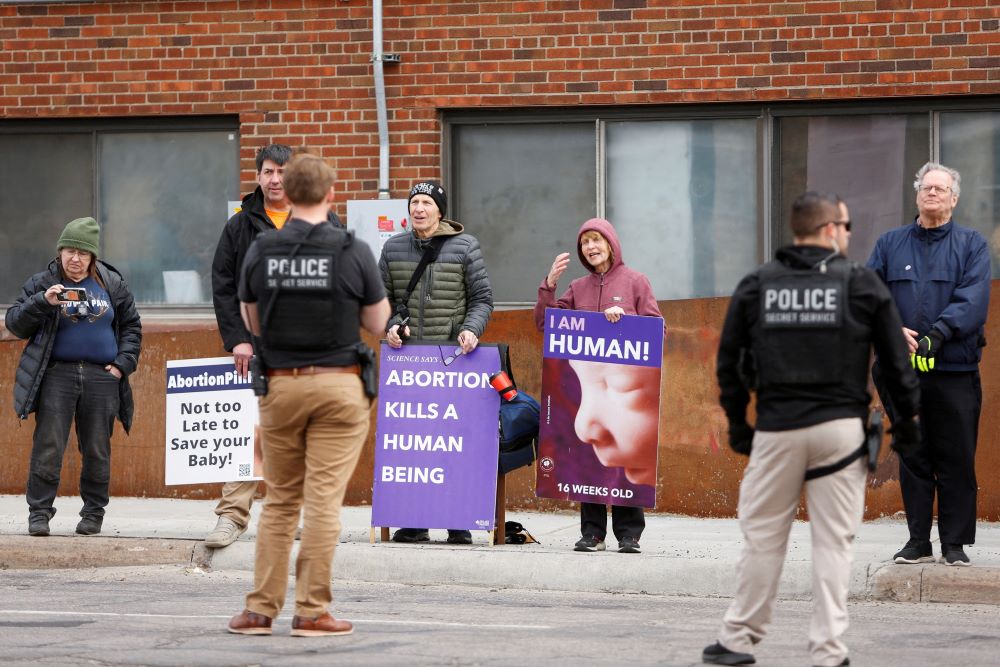
People protest abortion as U.S. Vice President Kamala Harris visits an abortion clinic in Minneapolis on March 14. It was the first time a president or vice president visited an abortion clinic. (OSV News/Reuters/Nicole Neri)
The Christian celebration of Easter is about new life, yet the world's consciousness remains flooded with ideas of death, where it is occurring due to war and famine and how to make it happen — think euthanasia and abortion.
Politicians may wring their hands over war and famine, yet they still pay for bombs while providing humanitarian aid. If life is precious, why is it so difficult to do the right thing?
In the U.S., a pastiche of opinion on life issues confuses discussion at both the national and state levels.
Since the Supreme Court turned the question of legalized abortion over to the states, a few enacted laws against abortion, while others moved to enshrine it.
The state constitutions of California, Michigan, Ohio and Vermont allow abortion, and most other states legally protect it, some later in pregnancy. In the 14 states forbidding abortion, meanwhile, some laws are so extreme as to endanger the lives of the mothers.
IVF, combined with abortion, can come as close to eugenics as any science fiction writer could predict. Do war and famine play into that scenario?
One wonders why politicians are allowed to make medical decisions. It seems odd that the U.S. cannot protect its own citizens from state legislatures, but that is a fact.
As the idea that human life is dispensable moves across the country, state legislatures have taken it upon themselves to decide how it can be ended. Following Canada's lead, several U.S. states are joining the euthanasia bandwagon.
For example, the New York State Assembly now has a "medical aid in dying" bill in committee. "Medical aid in dying" is defined as "the medical practice of a physician prescribing medication to a qualified individual that the individual may choose to self-administer to bring about death." (We should call it what it is: assisted suicide.)
New York is not alone. Illinois, New Hampshire, Maryland, Michigan and Virginia have talked about it. Ten states — California, Colorado, Hawaii, Maine, Montana, New Jersey, New Mexico, Oregon, Vermont, Washington — plus the District of Columbia — permit it.
Despite politicians' self-professed interest in caring for innocent people where war, famine or political unrest erupt, there seems to be a rush to eliminate whoever can be deemed expendable, whether by abortion or assisted suicide.
And then there is IVF, the process of human in vitro fertilization that often produces more viable fertilized eggs than any mother can carry. Selective reduction of implanted embryos seems to have given way to selective implantation. Remaining embryos are either frozen or destroyed. There has got to be a better way.
All this echoes a creepy recollection of Aldous Huxley's Brave New World, which includes "death conditioning" and the happiness-inducing drug, soma, used individually and vaporized over crowds. Remember the selective breeding Huxley wrote about, with Alphas at the top of the caste system and Epsilons at the bottom?
IVF, combined with abortion, can come as close to eugenics as any science fiction writer could predict. Do war and famine play into that scenario?
Are politicians thinking about that?
Advertisement
There is virtually no daylight between policies on IVF and abortion in either major political party. Support of assisted suicide is a little cloudier, at least on the national level. But it is growing in both sides of local legislatures.
It is all about "personal choice."
Which begs the question: whose choice?
Human life is human life. It is not about "personhood." It is about understanding that, whether embryonic, fetal, diminished or endangered: Human is human.
To deny that fact is to deny one's own position among the stars.
The Christian Easter celebration of the resurrection of Jesus Christ includes a promise of life after death. Whether we agree or disagree with what religions teach, until our own limited lives come to an end, we are all required to protect humanity.







